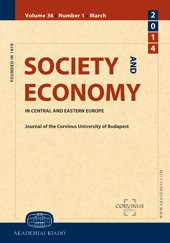From eco-efficiency to eco-effectiveness? The policy-performance paradox
From eco-efficiency to eco-effectiveness? The policy-performance paradox
Author(s): Maria CsutoraSubject(s): Business Economy / Management, Energy and Environmental Studies, Environmental and Energy policy, Economic development
Published by: Akadémiai Kiadó
Keywords: trade-offs; sustainability; environmental strategies; multinational enterprises; environmental management systems; eco-efficiency;
Summary/Abstract: The internalisation level of sustainability issues varies among topics and among countries. Companies give up less internalised issues for more internalised ones. Discrepancies between legal, market and cultural internalisation lead to different escape strategies: firms develop a high level environmental management system and they have nice sustainability policy and reports. These achievements cover the fact that their total emission keeps increasing and they do not proceed in solving the most crucial global community or corporate governance problems. ‘Escaper’ firms are often qualified as ‘leading’ ones, as a current stream of research is also ‘escapist’: it puts too much emphasis on sustainability efforts as compared to sustainability performance. Genuine strategies focus on hardcore sustainability issues and absolute effects rather than on issues easily solved and having high PR effects. They allow for growth in innovative firms, if they crowd out less efficient or more polluting ones. They produce positive environmental value added when sector average eco-efficiency is used as benchmark and do not accelerate market expansion and consumerism.
Journal: Society and Economy. In Central and Eastern Europe ǀ Journal of the Corvinus University of Budapest
- Issue Year: 33/2011
- Issue No: 1
- Page Range: 161-181
- Page Count: 21
- Language: English

